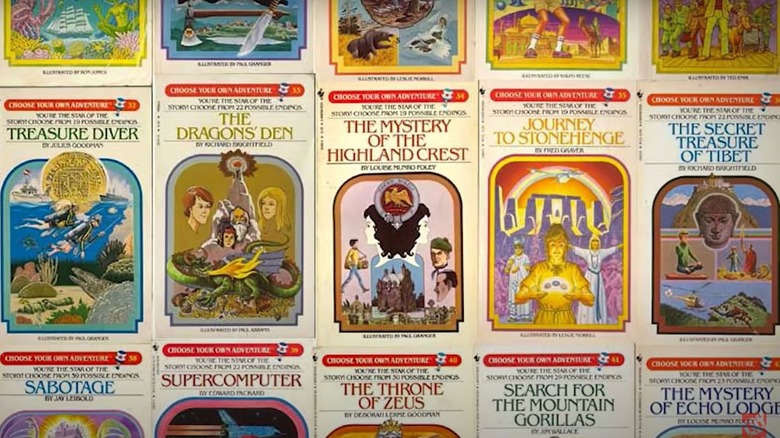Whatever Happened To Choose Your Own Adventure Books?
For those of a certain age, "Choose Your Own Adventure" books were among the heights of cool. Pick up a paperback, flip through, and at a certain page — boom, you get to choose what the character does: Underwater treasures, ancient civilizations, galactic dogfighting, dragon-slaying — "Choose Your Own Adventure" books had it all. They were "as contagious as chicken pox," The New York Times said, and by 1981, only two years after their launch, Bantam Books had four million copies in print.
Even though Gen-Xers and the retro nerd chic tend to think of "Choose Your Own Adventure" books as a "genre," they were actually just a single series. In the beginning, they were all written by just two dudes: R.A. Montgomery, a high school teacher who quit his job in 1981 to write full-time, and lawyer Edward Packard, who first got the idea when giving his kids story choices at bedtime.
The interactive component was the hook, just like video and tabletop games, and Packard and Montgomery saw educational value in the project when they pitched it to Bantam. But it was too much, too fast, and no one could keep up. According to Mental Floss, by the late '80s, the series had all but lost steam. In 1999, after 184 books and 250 million copies sold worldwide, Bantam called it quits.
Too many choices, not enough endings
Kids tore through "Choose Your Own Adventure" books. You could read them multiple times, and they were cheap. There was a low bar for entry (just grab one at the mall), and only one person was needed to "play."
At the same time, Montgomery and Packard over-scoped their project. As Montgomery told Slate, "We had as many as 30 to 40 endings in the first 10 to 15 titles. We were burning up storylines like crazy with all of those different endings. ... There wasn't a lot of room for character development, or plot development, or all the kinds of descriptive phrases that you need to build a scene."
Meanwhile, Bantam kept wanting more, and Montgomery and Packard went from their initial contract of six books apiece, per Mental Floss, to hiring subcontractors to help them keep up with their workload. By the end, per Board Games Tips, over 30 writers worked on the series.
And yet, David Lebling, one of the programmers of "Zork" (1980), a landmark storytelling title in computer gaming, pointed out the ultimately restrictive nature of the books, telling Slate, "They're — what? One hundred fifty pages, max? So each page or every other page usually gives you two or three choices, and if you multiply that out that's not an enormous number of possible states."
Bit by bit, the books' formula grew transparent. All the while, a new medium was rising to take their place: video games.

